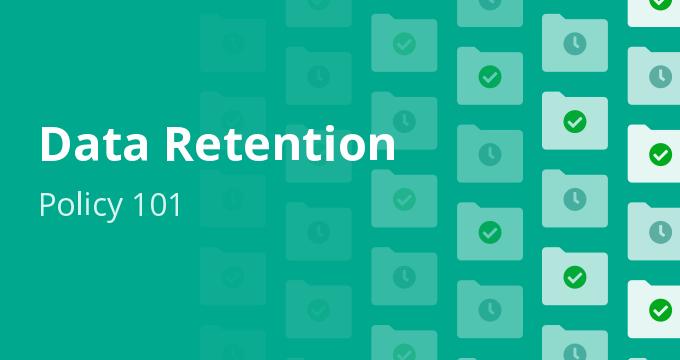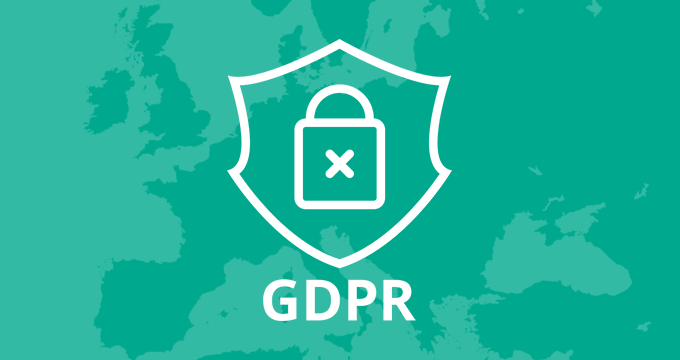Data is one of the most precious resources in the world today. Some even consider it more valuable than oil.
It’s so valuable that almost all data being generated and exchanged is being stored by businesses for various purposes.
But, there are certain laws governing what your organization can do with data, and even more importantly, for how long you can hold it.
To adhere to all data retention regulations, your organization must implement a strong data retention policy.
In this article, we’ll cover:
- Data retention meaning
- Why it’s important
- What data retention requirements you should follow
- How to design a data retention policy that works for you
What Is Data Retention?
Data retention is the action of storing data for a specific period of time called a data retention period.
Organizations retain their data to comply with specific data retention laws and regulations governing their industry.
While organizations retain data for long periods of time, they don’t keep it indefinitely, and to manage this, each organization has its own data retention policy.
What Is a Data Retention Policy?
A data retention policy is a set of rules governing how long an organization stores different types of data for compliance and regulatory purposes and how they will dispose of it when it is no longer needed.
Elements of a data retention policy:
- Data identification — Specify the types of data to be collected and stored.
- Storage methods — Detail how and where the data will be securely stored.
- Data formats — Standardize the formats in which data will be maintained.
- Retention periods — Define how long each type of data will be retained.
- Disposal procedures — Outline secure methods for erasing or destroying data at the end of its lifecycle.
- Backup & archiving — Establish procedures for creating redundant copies and long-term storage of critical data.
- Roles & responsibilities — Assign clear roles to staff members for managing and enforcing the policy.
A data retention policy’s primary goal is to ensure effective data management in line with applicable laws and regulations.
It’s worth noting that an organization can have multiple data retention policies for different types of data and situations.
Data retention policies can be bypassed if specific data is evidence in a legal case. This is when retained data can be put on legal hold for prolonged periods.
What is the data retention period?
The data retention period is the length of time that specific types of data are kept or maintained before being deleted or archived.
This period is determined based on legal, regulatory, and business requirements, ensuring that data is available for a necessary duration to meet compliance, operational, and security needs outlined in a specific data retention policy. After the retention period expires, the data is either securely disposed of or archived, depending on the organization’s policies.
Data should only be retained for as long as it’s useful and depending on the certain laws governing how long it must be kept.
Some data can be kept for longer periods of time if needed by the business and allowed for by data protection laws.
What type of data is included in retention policies?
The type of data being stored and included in the retention policy is different for every organization.
There are laws governing which type of data must be retained, but most of it is in the hands of the business policy.
Common data being retained includes:
- Employee records — Personal information, employment history, performance reviews, and payroll data.
- Financial records — Accounting documents, invoices, receipts, tax filings, and financial statements.
- Customer data — Contact information, purchase history, communication records, and support tickets.
- Email and communication logs — Emails, instant messages, and other forms of business communications.
- Legal documents — Contracts, agreements, litigation records, and compliance documents.
- Operational data — Reports, logs, project documentation, and internal communications.
- Healthcare records — Patient information, medical histories, treatment records, and billing information (relevant to healthcare organizations).
- Educational records — Student information, grades, attendance records, and correspondence (relevant to educational institutions).
- Government records — Public records, permits, licenses, and regulatory documents (relevant to government agencies).
- Research data — Study results, data sets, and experimental records (relevant for research institutions).
- Audit and compliance records — Documentation related to audits, inspections, and compliance checks.
- Sales and marketing data — Campaign data, sales metrics, customer feedback, and market analysis.
- IT and system Logs — System logs, security logs, and backup data.
- Intellectual property — Patents, trademarks, copyrights, and trade secrets.
Why Do You Need a Data Retention Policy?
The main reason any business needs a data retention policy is compliance with local, state, and federal laws.
These laws govern how long data must be retained and when your business must delete it from its systems.
Not complying with these laws leads to huge fines and legal actions.
Data retention policies give you an easy way to manage this data retention period.
Besides legal compliance, data retention policies help you with:
- Data security — Protect sensitive information by specifying secure data storage and disposal, reducing the risk of data breaches.
- Efficiency — Optimize data storage resources and reduce costs with unnecessary data storage.
- Litigation and audits — Ensure relevant data is available and properly retained for legal actions.
- Business needs — Support business operations by ensuring necessary data is readily available for analysis, decisions, and support.
- Privacy — Demonstrate commitment to data privacy by managing personal data.
- Data lifecycle management — Establish a clear process for data backups, archiving, and retention, improving data management.
Organizations must establish and execute data retention policies to meet these and other business objectives.
How Do Data Retention Policies Ensure Compliance?
Despite the operational benefits of enacting data retention policies, their greatest importance comes from the need to avoid violating specific data compliance laws.
Many laws and regulations include precise wording about records management, such as what data must be preserved and for how long.
Failure to follow these guidelines might result in financial, civil, or even criminal repercussions for your company.
Here’s a list of specific laws and regulations with their data retention policy requirements to give you a better idea of the function data retention plays in compliance:
- GDPR — Data must be kept in a form that allows identification of data subjects for no longer than is required for the purposes for which the personal data are processed.
- Health Insurance Portability and Accountability Act (HIPAA) — Although HIPAA does not contain any uniform criteria for keeping medical data, it does include explicit wording about the retention of HIPAA-related documents. HIPAA records include, but are not limited to, the following:
- Privacy Practices Notice
- Authorizations from patients
- Discipline procedures for employees
- Documentation of the incident and breach notification
- Maintenance records for physical security
- Logs of access
- The Fair Labor Standards Act (FLSA) — Businesses must keep records for at least three years. Time cards, work schedules, and recordings of changes in wages must be retained for two years in order to compute compensation. All records must be easily accessible to Department of Labor agents for examination.
- Sarbanes-Oxley Act (SOX) — Accountants who conduct audits shall retain all audit or review relevant data for five years from the end of the fiscal period in which the audit or review was concluded. Relevant data include memoranda, letters, communications, electronic records, and other documents generated, sent, or received in conjunction with an audit or review. Any public business that violates SOX data retention standards faces penalties, jail, or both.
| Related: Email Retention Policy Best Practices for 2024 |
How to Create a Data Retention Policy?
Creating a data retention policy for your organization isn’t easy and requires a lot of forward-thinking and taking many details into account.
Follow this process to develop your data retention policy:
- Assemble a team by determining the key stakeholders that should contribute to the policy. This team should consist of people from the legal, IT, administration, and business teams.
- Sort data into categories based on what your organization is working with while considering which data type will need its own retention policy. Usually, categories might be sales documents, customer information, and payrolls.
- Determine the regulations and laws that apply to your company based on the kind of data you store, your location, your industry, and other factors.
- For each record retention policy:
- Choose which data will be archived (and for how long) and which will be removed.
- Determine who will be in charge of each item category.
- Create a strategy for enforcing the policy, then implement it.
- Inform all impacted employees and teams about the policy.
- Create the policy with all the previous steps in mind. Your policy should be well documented and implemented in your archiving system.
- Communicate the policy with your whole organization and let every employee know how it affects them.
- Revise and improve the policy on a regular basis by analyzing new regulation changes and how the policy is affecting your business.
Remember that every organization is different, and your data retention policy creation process might look different, but having a process in place will help you develop the best policy for your unique needs.
Data retention policy best practices to follow
When creating your data retention policy, keep in mind these best practices:
- Prioritize research — Start by thoroughly researching relevant legislation and legal requirements that affect your organization. It’s also important to future-proof your policy.
- Make it simple — Use plain language in your policy for clarity and make it more employee-friendly. Begin with a straightforward approach and make adjustments when needed.
- Customize policies — Create specific policies for different data types while taking business necessity and legal requirements for retention periods into account.
- Be transparent — Inform customers, subscribers, and users about your data-handling practices, granting them control over their data whenever possible.
- Backup and archive — Invest in a reliable data archiving solution that can automate data archiving and retention policies, enhancing efficiency and security. Look for a system that aligns with your business needs and offers robust search capabilities.
- Perform regular backups — Regular backups protect against legal liabilities and minimize data loss risks during outages or unplanned downtime.
- Optimize data retention — Avoid storing data longer than necessary to prevent data bloat and enhance the security of your organization.
| Related: Email Archive VS Backup |
Data Retention Policy Examples?
If you’re still not sure where to start, take a look at these data retention policy examples from well-known companies and use them as inspiration for developing your own data retention policy template:
Make Data Retention Easy with Jatheon
Creating a data retention policy is hard enough, but implementing it and actually following it is another story altogether.
That’s why your data retention process needs to be automated, and Jatheon lets you do just that.
With Jatheon’s cutting-edge archiving solution, you will be able to set up custom data retention policies that automatically apply to every new piece of archived data.
Jatheon archives your email, social media, and mobile communication and automatically assigns it to the appropriate retention policy. It deletes the data when the time is right while giving you the option to retain it for longer periods of time with the legal hold feature.
Automatically manage your data retention policies with Jatheon’s cloud archiving solution. Archive your data for compliance and decide for how long you will retain it, let Jatheon handle your data management and deletion.
Summary of the Main Points
- Data retention involves storing data for a specific period, necessary for compliance with industry laws and regulations.
- A data retention policy is a set of rules on how long data should be stored and how it should be disposed of. It’s crucial for ensuring legal compliance and avoiding fines.
- You can have multiple data retention policies in place for different data types.
- Besides allowing your organization to stay compliant, data retention policies enhance data security, efficiency, privacy, and overall data lifecycle management.
- Key elements of such a policy include data identification, storage methods, data formats, retention periods, disposal procedures, backup and archiving, and roles and responsibilities.
- Policies help avoid violations of data compliance laws, such as those stipulated by GDPR, HIPAA, FLSA, and SOX.
- To automate your data retention, it’s best to implement an archiving solution that automatically applies custom data retention policies to every new piece of archived data.
FAQ
Does GDPR have a data retention policy?
The GDPR doesn’t have a set timeframe for how long data needs to be kept. Organizations need to determine their own data retention timeframe, but the GDPR requires them to clearly outline the retention period before the data is collected.
What is the minimum number of retention policies?
The minimum number of retention policies an organization needs to have is one. You can have multiple retention policies for different types of data being collected, branches of the organization, or legal mandates, which offers a lot of flexibility when complying with law while optimizing resource storage. Having no retention policy usually means that data is retained indefinitely, which may not align with privacy regulations.
What is the most common backup retention policy?
One of the most common backup retention policies is the Grandfather-Father-Son (GFS) method. It involves retaining multiple backup copies for different retention periods. These periods include daily (Son), weekly (Father), and monthly (Grandfather). The other most commonly used method is the “3-2-1 method,” meaning “maintain 3 copies, store copies on 2 different types of storage media, keep 1 copy on an off-site location.”
What are some common data retention policy issues?
Data retention bolsters many challenges, such as adjusting your policy to different legal regulations, setting a data retention schedule that will prevent data over-retention and under-retention, keeping your retention policy flexible for different types of data and their legal reasons, updating your policies with technological advancements, and creating a policy that is optimized with your organization’s budget.
How often should a data retention policy be reviewed and updated?
Data retention policies should be reviewed regularly, ideally once a year, to ensure they remain compliant with changing laws and business needs. Reviews should also occur when new legislation emerges or business operations change significantly.
What are the potential risks of not having a data retention policy?
Risks include legal penalties, increased vulnerability to data breaches, inefficient storage costs, difficulties in legal discovery, and damage to the organization’s reputation due to data mishandling.
Read Next:Effective Email Retention Policy Best Practices for Staying Compliant Data Retention Requirements in the United Kingdom Master Compliance by Archiving Microsoft Teams Channels and Chats |











